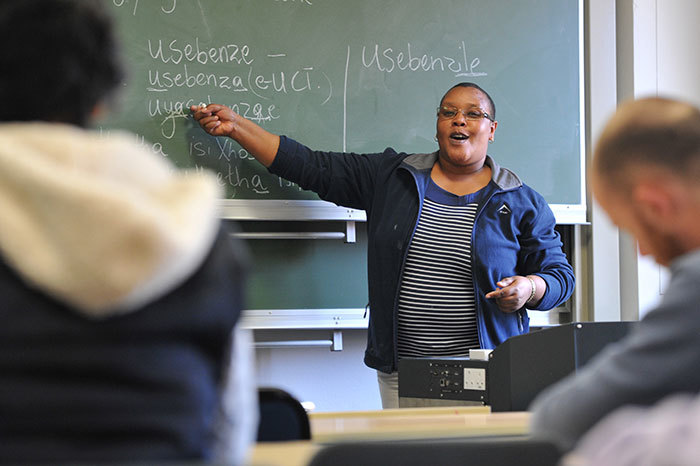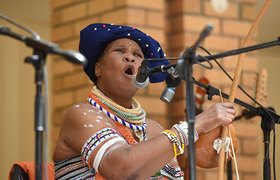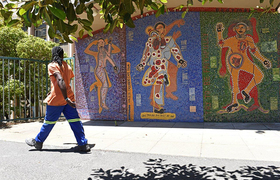Taking vernac to academia
27 July 2015
One would be wrong in thinking that the Multilingual Education Project (MEP) only offers courses in Xhosa communication skills for staff and students.
MEP plays an important role in helping UCT staff and students become more multilingual, offering language service courses in law, health sciences, psychology, social work and engineering, as well as Xhosa for students doing introductory philosophy and ethics courses (as part of which students don't just learn the language, but also study socio-cultural aspects relevant to their discipline). MEP staff run the Multilingual Signage project, which aims to translate all UCT signs into Afrikaans and Xhosa, and help with the translation of university stationery and publications – anything from business cards and letterheads, to reports and websites. They also assist with the naming of university buildings, identifying names such as Hoerikwaggo, for example – or Kopano, Hlanganani or Masingene – and develop multilingual glossaries for specialist subjects (such as statistics and economics).
Masithethe isiXhosa can be considered the MEP's flagship initiative. The course aims to develop the Xhosa conversation skills of UCT staff and students over 12 weeks. Upon completion, participants can expect to be able to converse in Xhosa in everyday situations and to respond to simple enquiries in the workplace.
Cindy Gilbert, departmental manager of the Centre for Innovation and Learning and Teaching, explains how, during the course, her knowledge of Xhosa "was built on in a manner which allowed [her] to be stimulated, but not overwhelmed".
"The enthusiasm of the teachers made me feel excited about learning the language, as well as feeling that it was worthwhile even to learn the little bit I was learning."
The course also helped her in the workplace: her job at the time required regular interaction with students. "I think the students felt more 'met', and always enjoyed my attempts at greeting them and initiating a conversation in Xhosa," she adds.
Her number one tip to get the most out of the course is to have a real desire to learn the language. "Go home and review the work so that you build on your knowledge weekly. The course is structured in such a way that you are given an opportunity to use what you've learnt previously in each lesson, so [reviewing the work] always helps."
Multilingual glossaries
How would you explain climate change to someone who speaks Xitsonga? What of cosmology and numerical relativity in siSwati? MEP is helping grow indigenous African languages by developing multilingual glossaries, which promote the academic use and intellectualisation of these languages and supports students of the subject whose mother tongue might not be English."It is an established fact that language resources play a pivotal role in language development and natural language processing. If used effectively, multilingual glossaries provide a good scaffolding tool for students in learning new concepts," explains Assoc Prof Mbulungeni Madiba, coordinator of MEP.
MEP has already translated glossaries for statistics and economics into Afrikaans, isiXhosa, isiZulu, siSwati, Setswana, Sepedi, Sesotho, Tshivenda and Xitsonga. Glossaries for law, maths, psychology and political science are currently in development. MEP is also collaborating with the University of Pretoria to develop an open education resource (OER) term bank for all universities in South Africa. The project is funded by the Department of Higher Education and Training.
Story by Abigail Calata. Photo by Michael Hammond.
 This work is licensed under a Creative Commons Attribution-NoDerivatives 4.0 International License.
This work is licensed under a Creative Commons Attribution-NoDerivatives 4.0 International License.
Please view the republishing articles page for more information.










